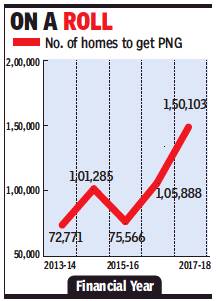Delhi: civil supplies
This is a collection of articles archived for the excellence of their content. |
Gas, for cooking
2013> 2018: PNG reaches record 1.5L kitchens
Number Of Connections Grew By 42% In 2017-18, April 4, 2018: The Times of India

From: Number Of Connections Grew By 42% In 2017-18, April 4, 2018: The Times of India
More and more households in the Delhi-NCR (National Capital Region) are opting for the convenience and cost-effectiveness of getting cooking fuel on tap, with Indraprastha Gas Ltd (IGL) adding 1.5 lakh kitchens to its PNG (piped natural gas) network in 2017-18.
The record number of additions, representing a growth of 42%, has taken the total households serviced by IGL, the sole operator of CNG (compressed natural gas) service for automobiles and PNG in Delhi-NCR, to nearly 9 lakh.
The company added 885 km of pipeline to its gas distribution network in 2017-18 against 578 km in the previous fiscal to speed up expansion of consumer base in Noida, Greater Noida, Ghaziabad and Rewari.
IGL MD E S Ranganathan said the company would improve upon its record in the current financial year (2018-19) by covering new colonies and reaching more homes in areas that already have PNG service.
“Resources in terms of material and manpower for this is already in place,” a company statement quoted him as saying.
The rapid expansion in PNG network is expected to free up subsidised LPG (liquefied natural gas) connections and cylinders for the Centre’s Ujjwala scheme, envisaging providing free LPG connection to poor households.
IGL had launched a outreach campaign with the aim of persuading more households to switch to PNG. Simultaneously, a large number of schemes were launched to make PNG attractive for new consumers, while various structural and process innovations were implemented to access partially feasible areas without compromising on safety.
IGL also sells CNG to more than 10 lakh vehicles through a network of 446 CNG dispensing stations. But while the number of CNG vehicles are rising, IGL is facing hardship in expanding its CNG stations in some Delhi areas due to land and other administrative constraints.
The problem has been compounded by vehicles from neighbouring townships in Haryana and UP crowding CNG stations in Delhi as the fuel is cheaper in the National Capital. Since CNG is not under GST (Goods and Services Tax), Delhi does not tax the fuel, while Haryana and UP impose different VAT rates.